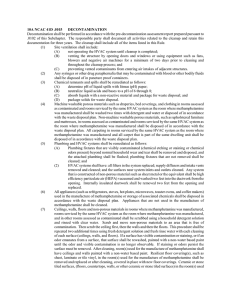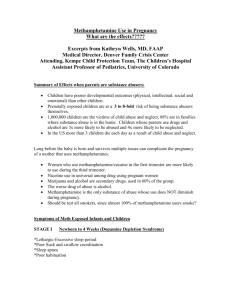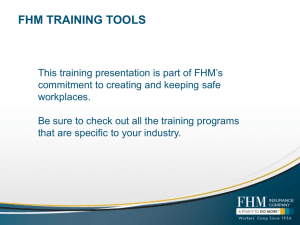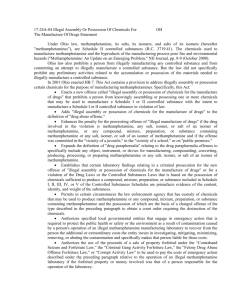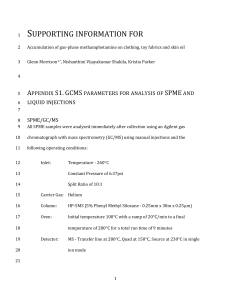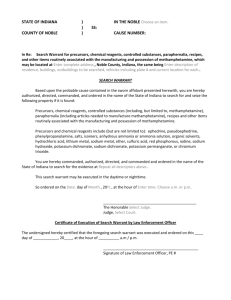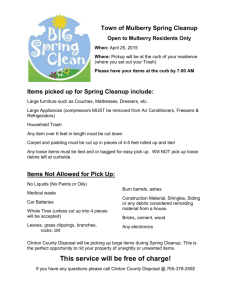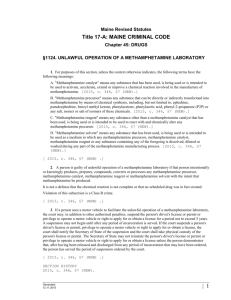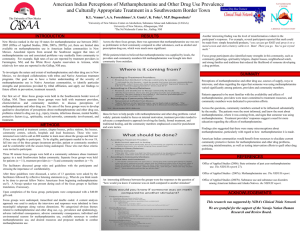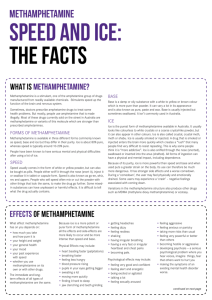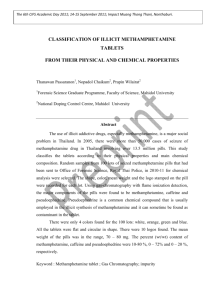DOC - ncrules.state.nc.us
advertisement
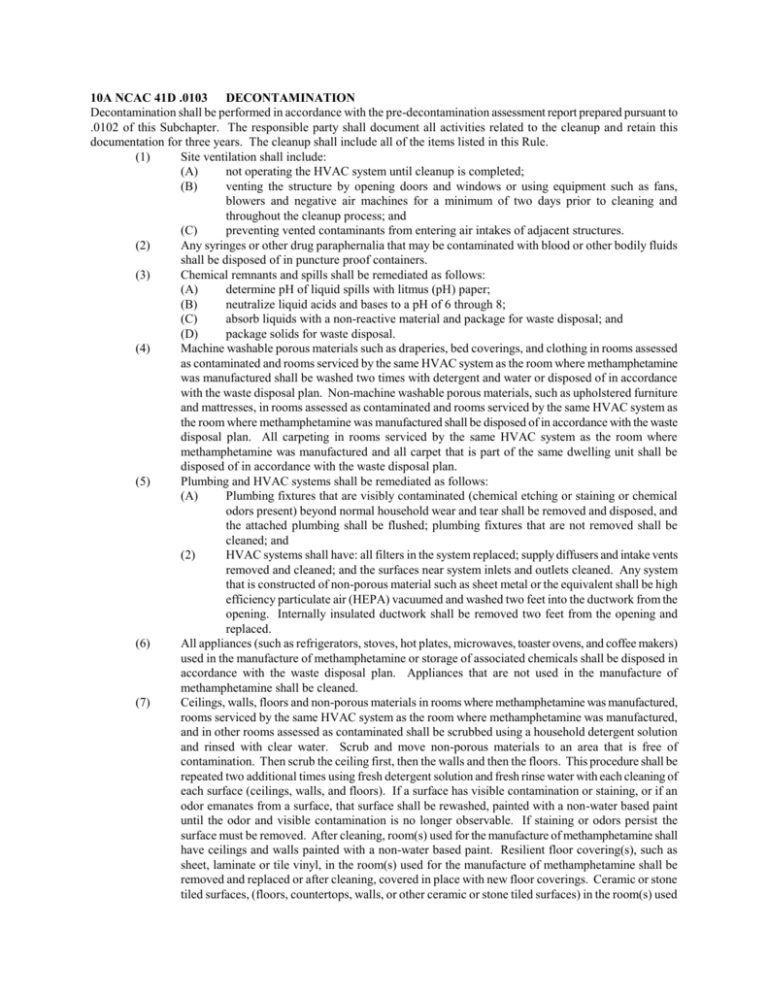
10A NCAC 41D .0103 DECONTAMINATION Decontamination shall be performed in accordance with the pre-decontamination assessment report prepared pursuant to .0102 of this Subchapter. The responsible party shall document all activities related to the cleanup and retain this documentation for three years. The cleanup shall include all of the items listed in this Rule. (1) Site ventilation shall include: (A) not operating the HVAC system until cleanup is completed; (B) venting the structure by opening doors and windows or using equipment such as fans, blowers and negative air machines for a minimum of two days prior to cleaning and throughout the cleanup process; and (C) preventing vented contaminants from entering air intakes of adjacent structures. (2) Any syringes or other drug paraphernalia that may be contaminated with blood or other bodily fluids shall be disposed of in puncture proof containers. (3) Chemical remnants and spills shall be remediated as follows: (A) determine pH of liquid spills with litmus (pH) paper; (B) neutralize liquid acids and bases to a pH of 6 through 8; (C) absorb liquids with a non-reactive material and package for waste disposal; and (D) package solids for waste disposal. (4) Machine washable porous materials such as draperies, bed coverings, and clothing in rooms assessed as contaminated and rooms serviced by the same HVAC system as the room where methamphetamine was manufactured shall be washed two times with detergent and water or disposed of in accordance with the waste disposal plan. Non-machine washable porous materials, such as upholstered furniture and mattresses, in rooms assessed as contaminated and rooms serviced by the same HVAC system as the room where methamphetamine was manufactured shall be disposed of in accordance with the waste disposal plan. All carpeting in rooms serviced by the same HVAC system as the room where methamphetamine was manufactured and all carpet that is part of the same dwelling unit shall be disposed of in accordance with the waste disposal plan. (5) Plumbing and HVAC systems shall be remediated as follows: (A) Plumbing fixtures that are visibly contaminated (chemical etching or staining or chemical odors present) beyond normal household wear and tear shall be removed and disposed, and the attached plumbing shall be flushed; plumbing fixtures that are not removed shall be cleaned; and (2) HVAC systems shall have: all filters in the system replaced; supply diffusers and intake vents removed and cleaned; and the surfaces near system inlets and outlets cleaned. Any system that is constructed of non-porous material such as sheet metal or the equivalent shall be high efficiency particulate air (HEPA) vacuumed and washed two feet into the ductwork from the opening. Internally insulated ductwork shall be removed two feet from the opening and replaced. (6) All appliances (such as refrigerators, stoves, hot plates, microwaves, toaster ovens, and coffee makers) used in the manufacture of methamphetamine or storage of associated chemicals shall be disposed in accordance with the waste disposal plan. Appliances that are not used in the manufacture of methamphetamine shall be cleaned. (7) Ceilings, walls, floors and non-porous materials in rooms where methamphetamine was manufactured, rooms serviced by the same HVAC system as the room where methamphetamine was manufactured, and in other rooms assessed as contaminated shall be scrubbed using a household detergent solution and rinsed with clear water. Scrub and move non-porous materials to an area that is free of contamination. Then scrub the ceiling first, then the walls and then the floors. This procedure shall be repeated two additional times using fresh detergent solution and fresh rinse water with each cleaning of each surface (ceilings, walls, and floors). If a surface has visible contamination or staining, or if an odor emanates from a surface, that surface shall be rewashed, painted with a non-water based paint until the odor and visible contamination is no longer observable. If staining or odors persist the surface must be removed. After cleaning, room(s) used for the manufacture of methamphetamine shall have ceilings and walls painted with a non-water based paint. Resilient floor covering(s), such as sheet, laminate or tile vinyl, in the room(s) used for the manufacture of methamphetamine shall be removed and replaced or after cleaning, covered in place with new floor coverings. Ceramic or stone tiled surfaces, (floors, countertops, walls, or other ceramic or stone tiled surfaces) in the room(s) used (8) (9) History Note: for the manufacture of methamphetamine shall be removed after cleaning, re-glazed or have grout stained using an epoxy-based stain. Wooden materials (floors, walls, ceilings, cabinets, or other wooden materials) in the room(s) used for the manufacture of methamphetamine shall be removed or after cleaning, sealed with a non-water based coating. After cleaning is complete, the property shall be aired out for at least three days to allow for remaining volatiles to disperse. Open all windows and use exhaust fans to exhaust air out of the house. During this time, the property shall remain off limits unless it is necessary to make visits to check on the site. Outdoor cleanup shall be completed in accordance with applicable rules administered by the North Carolina Department of Environment and Natural Resources. Authority G.S. 130A-284; Temporary Adoption Eff. January 1, 2005; Eff. April 1, 2005.
